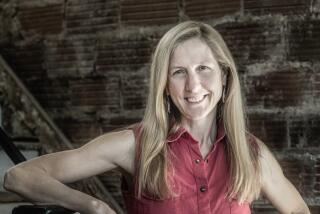Trying to save their old Kentucky home
- Share via
A lark from start to finish, “The Southern Belles of Honeysuckle Way,” by Linda Bruckheimer (“Dreaming Southern”), features women armed with razor-edged wit and keen intellects who take on their changing world. Good breeding, home-cooked food and warm hearts take center-stage in this well-written caper, where women promenade through gloriously restored mansions while sipping mint juleps and nibbling bourbon balls.
All that ails the main characters, Rebecca and her sisters Carleen and Irene, can be traced to the fact that they no longer reside in the precious Kentucky town of their childhood, Blue Lick Springs. They have been living in California for the last two decades, along with their aging mother, Lila Mae. The California they know, rife with Hollywood glitz and glitter that disguises the populace’s dissatisfaction, is the land of cookie-cutter home developments, fast-food franchises and weight obsession, serial divorce and marital despondency. The three sisters plan a 75th birthday celebration for their mother on the old family soil. Blue Lick Springs is unsullied by the modern world; it’s as heaven-like as the women remember it, where everyone is neighborly and good manners reign supreme. Development has been kept at arm’s length thanks to the town’s remote location and low profile. This is where the sisters, formerly of Honeysuckle Way, learned to share soda pop with one another as a truce after bickering. “We’ve grown up believing that all rifts can be chinked with a Coca-Cola,” Rebecca tells us.
All this goodness, though, is being threatened. Rebecca, who’s married to a wealthy Hollywood film producer and has money to burn, buys and restores a historic site in Blue Lick Springs, turning it into Miz Becky’s BBQ Shack. However, she soon finds foul play afoot, swirling around a big-time developer who is buying up land right and left, with plans to demolish long-standing buildings and put up strip malls and California-style suburban homes.
“The object of our desire is a glimpse of the good old days, before progress and the bulldozer ambushed our heritage,” Rebecca says. At times the plot is convoluted and the troupe of characters can seem unwieldy, but they are all focused on a central point: By preserving Blue Lick Springs, each will be able to heal the personal wounds that hobble, whether weight gain, an aimless career, an unhappy marriage or lack of self-esteem.
Cooking and eating rich fare take up a good deal of the characters’ time, but those who’d entered the story with a few pounds to lose do so effortlessly, thanks to vigorous walks and the healthy lifestyle of Kentucky. Irene, who began the story as a drug addict and alcoholic, imbibes green apple wine in Blue Lick Springs, seemingly with no ill effects. In many ways, it is a miraculous place clothed in the ordinary, where loyalty, family love and traditional values trump whatever glamour California might offer.
The novel unfolds at a brisk pace, thanks to Bruckheimer’s deft use of metaphors and humor. She describes Johnny Cash’s voice, for example, as “gravel spliced with black velvet” and the pompous accountant who wants to shut down Miz Becky’s is “all puffed up like a tuba player struggling to hit a high note.” Lots of down-home Kentucky dialogue peppers the text: “[H]e’s lak a big ole pimple, aint he?; squeeze him a little and all sorts of interestin’ stuff spurts out.”
As with characters in an old-fashioned melodrama, we know whom to cheer for and whom to boo, which plot developments to applaud and which to be wary of. This novel is pure escapism, a lighthearted journey to a land far, far away from the problems of contemporary life and that “thief called progress.”
More to Read
Sign up for our Book Club newsletter
Get the latest news, events and more from the Los Angeles Times Book Club, and help us get L.A. reading and talking.
You may occasionally receive promotional content from the Los Angeles Times.






